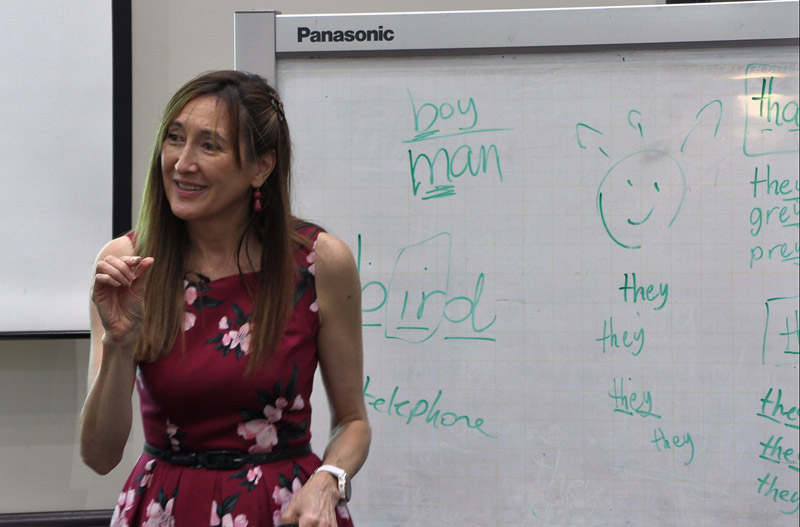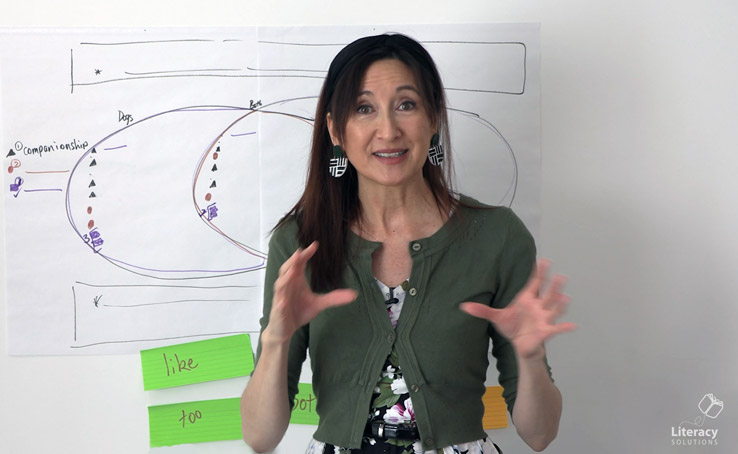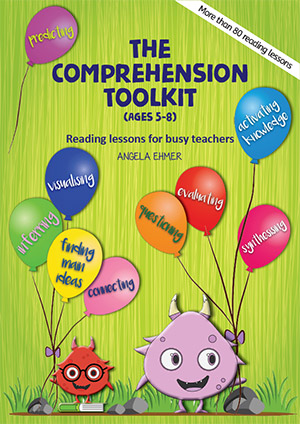Private Lessons
Angela Ehmer now offers private reading and writing lessons to meet the needs of your child.

Does your child need support in reading and/or writing?
Are you looking for a reading specialist to
unlock your child’s full potential?
Ensuring that all children reach their full potential in reading is essential, as reading proficiency directly impacts confidence, self-esteem and overall academic performance. Research shows that reading success influences achievement across other subjects and highlights a strong correlation between early reading abilities and long-term life outcomes, such as crime rates, homelessness, and financial stability. Longitudinal studies consistently reveal a close relationship between reading skills and future social and economic success.

Addressing reading difficulties early
Many children experience challenges in reading, and research underscores the necessity for specialised support to prevent them from falling behind. Once children struggle with reading, the gap between their skills and those of their peers can quickly widen, making it increasingly difficult to catch up. Early intervention is critical to ensure that children remain on track.
The "Matthew Effect", coined by Professor Keith Stanovich in 1986, refers to the phenomenon where "the rich get richer, and the poor get poorer." Derived from Matthew 25:29, it describes how children who excel early in reading continue to progress rapidly, while those who struggle fall further behind over time. Initial differences in skills and knowledge, such as vocabulary, phonological awareness, and comprehension, create disparities in reading growth. Neuroscience has further clarified how neurobiological factors can affect reading abilities, even in children with strong oral communication and general knowledge. The Matthew Effect highlights the inequities some children face in literacy development, often due to factors beyond their control. It also highlights the need for urgency in providing support for struggling readers.
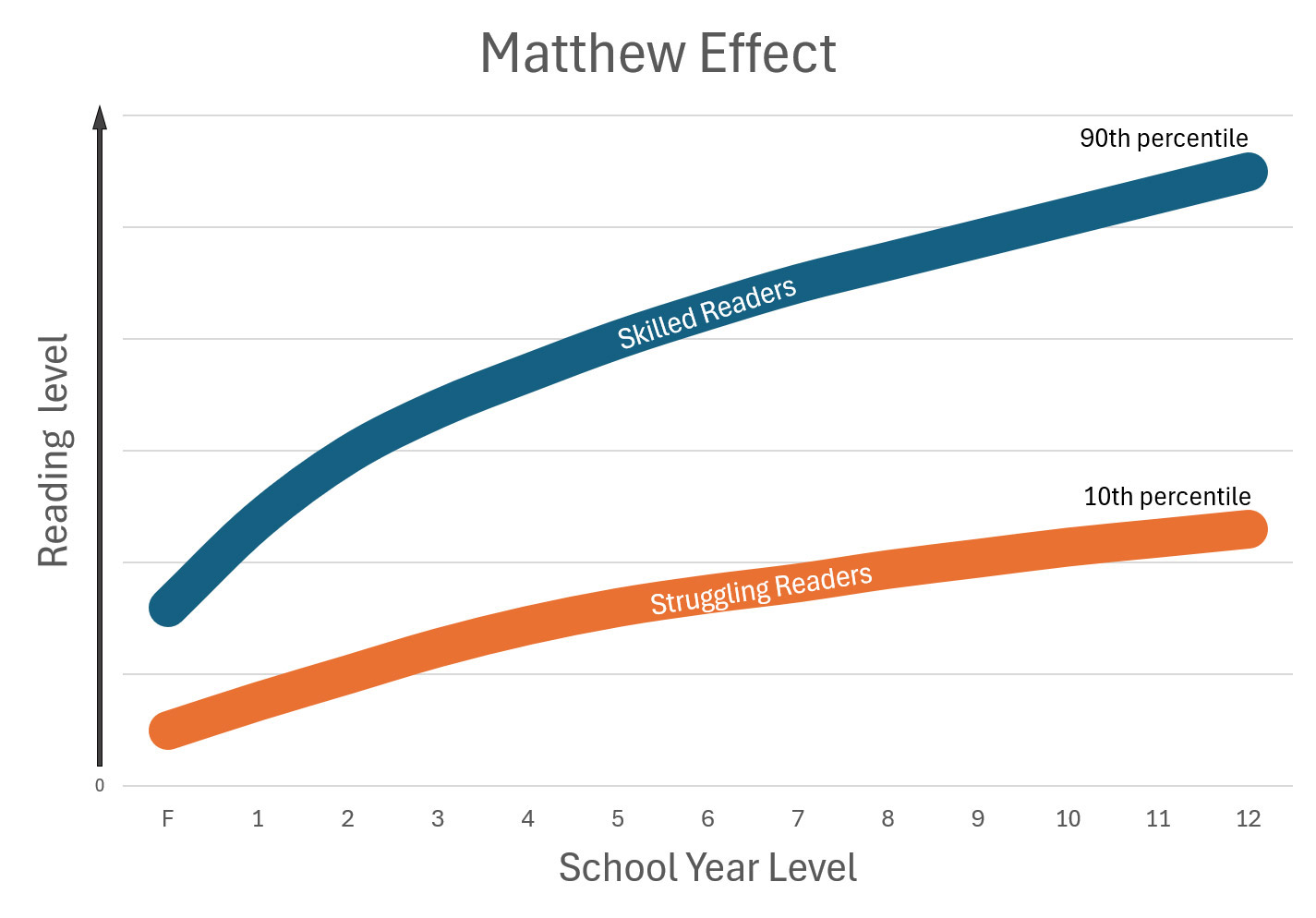
The Matthew Effect highlights the inequities some children face in literacy achievement.
Are all children reaching their potential?
Many children, regardless of their current reading level, have the potential to improve. Some may be reading at an average level but possess the capacity to perform at higher standards. Others may appear to be progressing well with minimal effort, suggesting they may also be underachieving. It is essential to recognise and address the needs of all learners to help them reach their full potential.
Factors limiting reading success
Numerous factors contribute to a child's reading success. These include:
- Environmental influences: Both at home and in school
- Neurobiological factors: How a child’s brain processes language, speech sounds, and text
- Executive function: Including attention, self-regulation, focus and cognitive flexibility
- Physical factors: Such as sight, hearing, core strength, and motor skills
- Attitudinal factors: Including motivation, engagement, confidence, willingness to take risks and resilience
Addressing these factors early on can significantly enhance a child's reading abilities.

Why has my child fallen behind?
Some children may require instruction at a different pace or level of intensity. This can be challenging to provide in a regular classroom setting. Teachers juggle the needs of many students, making it difficult to provide individualised attention to those requiring more assistance. While classroom teachers strive to support all learners, class sizes, varying student needs and broad curriculum content often limit them from offering the intensive instruction some children require.
Students who struggle with reading require more frequent and focused individualised or small group lessons, targeting both skills, sub-skills and other reading behaviours. This demands significant time and expertise. Teachers understand struggling readers need more instructional time, more rigorous instruction and more tailored programs. They strive to provide what they can.
Can my child do better?
Teachers often identify students who are performing at average levels but have untapped potential. These children may be ‘coasting’ through the curriculum and sitting comfortably in the middle or at a ‘C’ level. With more focused instruction, they can develop stronger reading and metacognitive strategies, leading to higher performance.

Can my child excel?
Some students are already performing at high levels and with focused teaching have the capacity to reach and manage increasingly more difficult texts. Advanced learners must develop the ability to navigate abstract or complicated themes and ideas, sophisticated language structures, and varying text forms. They require instruction which develops deeper understandings and fosters creativity, innovation and critical thinking. Focused instruction, along with the use of rich and complex texts fosters intellectual growth and assists these children to reach their potential.
What is early intervention?
Early intervention refers to specialised support provided to children who have fallen behind their classmates in reading. The aim is to build a solid foundation of essential reading strategies, skills, and knowledge to prevent further academic decline. Research shows that intensive, early intervention is the most effective method to address reading difficulties and prevent widening achievement gaps.
What are the different kinds of reading support?
Intervention in school settings may take the form of:
Small group teaching provided by:
- a specially trained reading teacher
- a trained teacher
- a support person such as a teaching assistant or aide
Individualised teaching provided by:
- a specially trained reading teacher
- a trained teacher
- a support person such as a teaching assistant or aide
A software or online program supervised by:
- a teacher
- teaching assistant
Intervention outside of school settings may take the form of:
Unstructured tutoring or general, unplanned assistance
- Usually provided by a university student, teacher in training or teacher
- Tutor assists with school-related tasks
Structured tutoring or assistance in which each session has planned tasks or follows a commercially-produced, prescribed program
- Provided by tutors with knowledge of the commercial program
- Usually a one-size-fits-all approach
- Tutor may be a teacher or an untrained adult
Software or online program
- Students may attend in larger groups
- Supervisor may be a trained teacher, but is often an untrained person
Reading lessons
- Students attend planned, one-to-one lessons with a teacher with diploma or degree qualifications in education
- Lessons may be based on a commercial program or planned by the teacher
- Student data may inform lesson planning
Specialist reading lessons
- Students attend planned, one-to-one lessons with a reading specialist with degree and post graduate qualifications in education and/or additional formal industry qualifications
- Every lesson, student data is collected, analysed and used to inform the next lesson
When administered with frequency and rigor, early intervention can successfully close or narrow the gap for many children.
Do older readers require intervention?
Yes. Although early intervention is most effective, older readers who are struggling also require focused, intensive support. Without specialised instruction, these children are at risk of falling further behind, making it harder each year to narrow the gap. Intervention at any stage can help students improve reading proficiency.
How do schools support struggling readers?
In school settings, teachers differentiate instruction to meet the needs of students with varying reading abilities. Some students may receive additional support from specialised staff, including teaching assistants and tutors. Despite these efforts, it is often difficult for schools to provide the level of individualised attention needed for all struggling readers.
Schools and teaching staff invest significant time, energy and money into funding intervention and other special programs to support their students. Despite this, not all children will become proficient readers or reach their full potential.

What makes our programs unique?
Research consistently highlights teacher expertise as the most critical factor impacting student achievement levels. It also stresses the importance of assigning the most skilled educators to the least skilled readers. Our programs are not only facilitated by a reading specialist, but teaching practices are informed by research in education and across the cognitive sciences.
All lesson components and teaching strategies in our programs are grounded in evidence-based methods which incorporate the following key components:
- A clear, logical scope and sequence of skills, tailored to each child’s current level
- Lesson skills drawn precisely from and tailored to, each student’s data
- Regular monitoring of reading progress to adjust the teaching approach
- High levels of intensity and precision in teaching
- Structured lesson planning to maximise efficiency
- Strategies to promote cognitive flexibility
- Evidence-based strategies to link both reading and writing
- Brain-based strategies to accelerate learning
- Opportunities for multisensory learning and active student participation
These features, combined with specialised instruction planned and facilitated by a reading expert, ensure that every lesson is specifically designed to meet the needs of each child.
Choosing the right support for your child
When seeking private support for your child, it’s crucial to evaluate both the program and the qualifications of the teacher. Effective instruction requires not only a structured curriculum but also a deep understanding of how to address the unique needs of struggling readers. Many commercial programs require minimal training, and some do not require qualified educators to facilitate instruction. This impacts the quality of teaching a child receives.
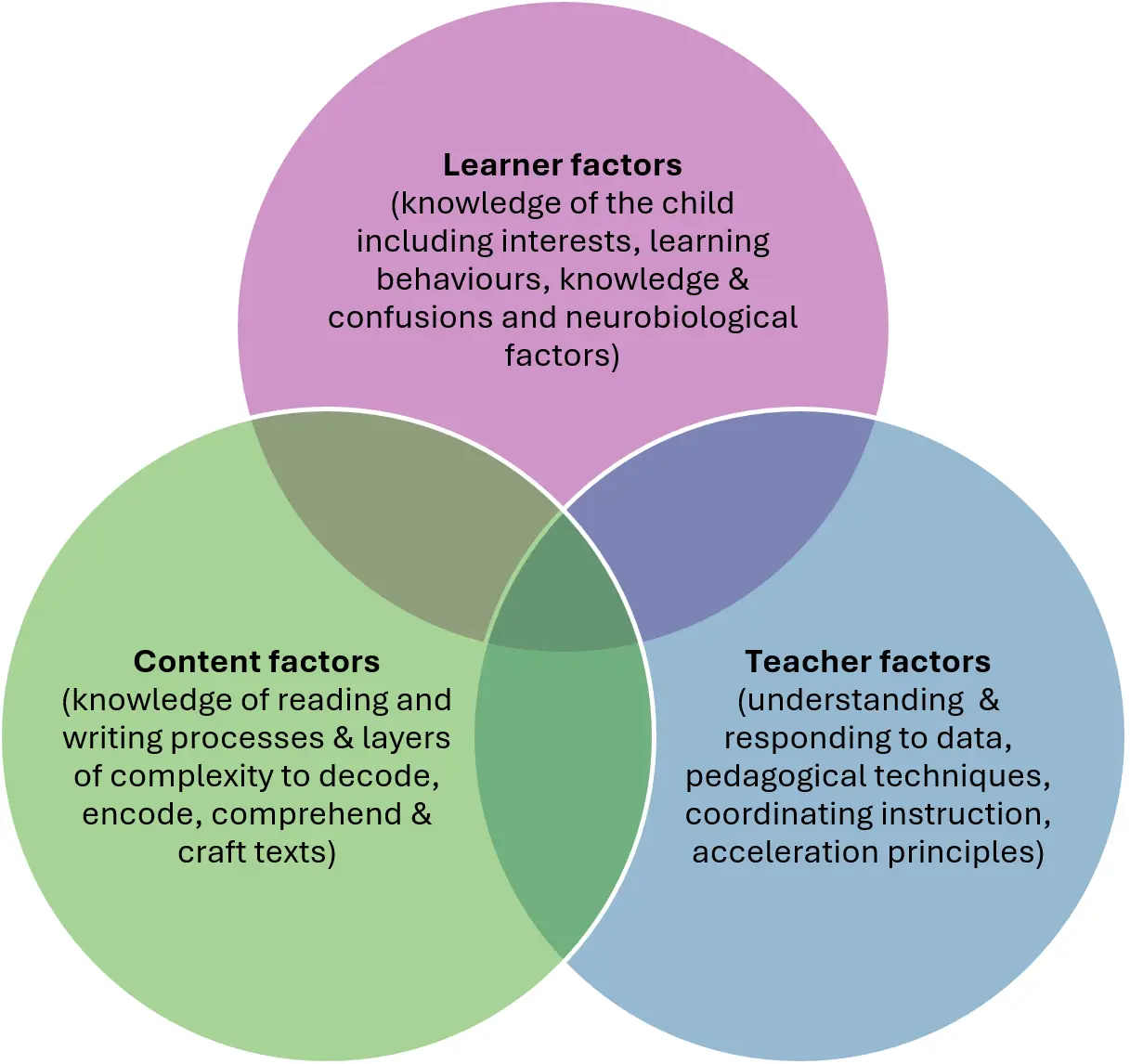
Three critical factors impacting achievement: child, content, teacher
Should I have my child assessed?
If your child is struggling with reading, it may be beneficial to have them assessed for underlying issues, such as:
- Sight or hearing problems
- Phonological processing or working memory issues
- Speech-language difficulties
- Dyslexia
- Other cognitive or educational assessments
An assessment can help identify specific challenges and ensure that your child receives the most effective support.
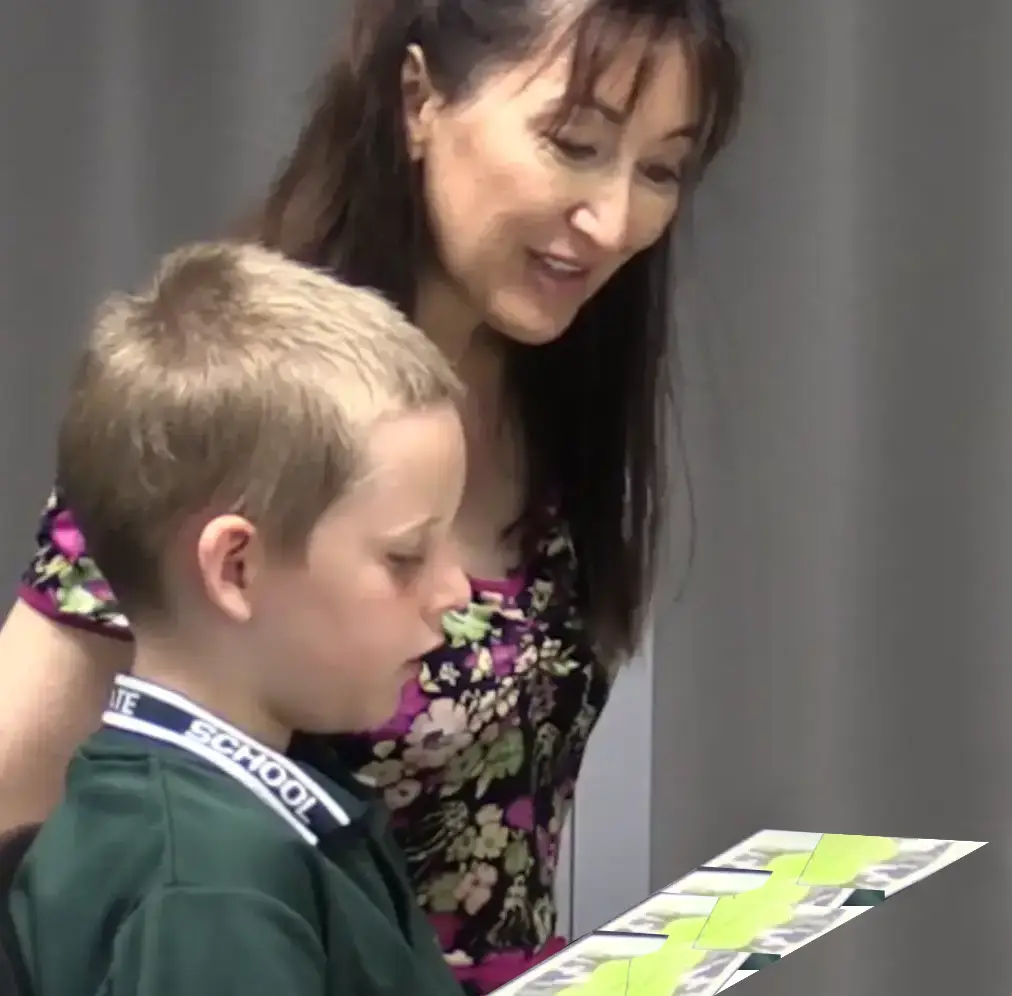
About Angela Ehmer
Angela Ehmer is a highly experienced literacy consultant with over 20 years of expertise in teaching, coaching, and professional development for educators. She works with schools across Australia to improve reading outcomes for students of all abilities, including both high-performing students and those needing intensive support.
Angela’s credentials include:
- Presenting at local and international educational conferences
- Training over 20,000 teachers and support staff
- Consulting to more than 500 schools
- Demonstrating more than 1,000 whole class, small group and individualised lessons with children of varying abilities
- Designing and delivering over 1,500 workshops for educators
- Supporting and advising educational publishers by authoring teacher reference texts and consulting on reading program inclusions to teach language, comprehension and high order thinking skills, and reviewing and advising around decodable texts
Angela’s work with educators, publishers and community groups integrates research across the disciplines of neuroscience, psychology, and education to support students in achieving their full reading potential.
What does Angela provide?
Angela offers highly individualised reading lessons designed to address each child’s unique needs. Rather than relying on a standard program, Angela uses data-driven insights and tailored teaching strategies to provide effective, targeted support for struggling readers. Lessons are meticulously planned, incorporating ongoing assessments to ensure continuous progress.
Angela’s thoughts on data …
"I love data. It means you never guess what to teach next. You know precisely what skill the child needs, why the skill matters and how that skill needs to look in the next lesson.
If you want the best outcome, you need to teach at the cusp of what the child needs to know. Without specific observations and data, lessons are not informed by evidence of reading behaviour. Every lesson matters. All children, but particularly those struggling with reading must receive instruction which focuses on the specific skill or skills they need right now."
Reading services
Angela offers private services to families seeking a model of intensive support for primary-school children. Services include:
ELEVATE
an intensive, sequential program of skills-based instruction for students who have fallen behind and now need to progress at a faster rate than others (achieving below C level)
EXTEND
a program combining skills-based, comprehension and high-order thinking to lift students currently achieving at a ‘C’ level.
EXCEL
a program combining skills, knowledge and critical thinking abilities of students currently achieving at a ‘B+’ or ‘A’ level.
ELEVATE
Ideal for children who are below the class average in reading, this program offers frequent lessons to accelerate progress and reduce or eliminate the learning gap.
- 45-minute evidence-based, in-person lessons, planned specifically for your child
- Communication with your child’s teacher to gather data and other pertinent information and other testing/screening as needed
- Planning and monitoring subskills using an evidence-based scope and sequence and other monitoring tools
- Five research-based lesson components incorporating multiple strategies to accelerate reading progress
- 2-5 minute parent debrief after each lesson
- discuss progress (optional)
- take-home tips for parents
Note:
- Each child enrolled in the ELEVATE program is entitled to substitute one ELEVATE lesson for an ELEVATE PLUS lesson.
- Please provide copies of school reports and assessment to assist with program planning.
EXTEND
Suitable for children achieving a ‘C’ or average level, but with the capacity to perform higher and with recommended attendance of one to three times per week.
- 45-minute extension lessons (in person or via webinar)
- Communication with your child’s teacher to gather data and other pertinent information (your child’s teacher will be asked to provide information to suggest your child has the potential to perform higher)
- Planning and monitoring skills, strategies and knowledge to access complex texts
- Vocabulary, word work, dictation
- Assigned homework
- 2-5 minute parent debrief after each lesson
- discuss progress (optional)
- take-home tips for parents
Note:
- Parents need to provide the assigned texts for children on the EXTEND Program.
- Please provided copies of school reports and assessment to assist with program planning.
EXCEL
For children performing at a B+ or A level, this program provides ongoing challenges and opportunities to further intellectual growth.
- 45-minute excellence lesson (in person or via webinar)
- Communication with your child’s teacher to gather data and other pertinent information
- Planning and monitoring skills, strategies and knowledge to access complex texts
- Extension vocabulary and word work
- Assigned homework
- 2-5 minute parent debrief after each lesson
- discuss progress (optional)
- take-home tips for parents
Note:
- Parents need to provide the assigned texts for children on the EXTEND Program.
- Please provided copies of school reports and assessment to assist with program planning.

ELEVATE PLUS
Want to assist your child to progress more quickly?
Sit in, Build skills & Help at home
If your child is on the ELEVATE Program, you may opt for one or more ELEVATE PLUS lessons.
Angela appreciates the strong desire of many parents to assist their child, particularly when reading is difficult. Parents of children on the ELEVATE program are eligible to book ELEVATE PLUS sessions to assist their children to progress more quickly. In the 70-minute ELEVATE PLUS session, you will:
- Observe your child’s 45-minute reading lesson
- Walk through each stage of the lesson, discuss the target skill and how it connects to each lesson component, share Angela’s observations of your child’s progress on new and revised skills
- Be given a schedule of short, simple take-home tasks to practice target skills prior to the next lesson
It is imperative your child’s lesson remains high yield. For this reason, the following conditions apply to ELEVEATE PLUS sessions:
- only one adult is permitted to observe
- phones & devices must be switched OFF (NO EXCEPTIONS)
- all questions must be held until the lesson has concluded
- no additional children, pets, toys, or other distractions are permitted
Where are lessons held?
ELEVATE lessons are conducted in Angela's home, Carindale.
For ELEVATE lessons in your home, you must be within 5km of Carindale with a suitable room:
- quiet teaching space free from distractions and with a closable door
- suitable furniture (tables and chairs at a suitable height for your child … trestle table dimensions or equivalent), floor space, and a large, upright, magnetic whiteboard
- air-conditioning/heating/ventilation
For lessons at your home, please add:
- 30% to fees
- fee for travel time & mileage is $1.80 per kilometre.
EXTEND/EXCEL lessons are available at Angela's home, Carindale, or via webinar (Zoom).
Lesson fees (10 weeks)
| Lessons per week | Session duration | Fee (GST included) |
|---|---|---|
| One (Total: 10 lessons) | 50 minutes* | $2,200 |
| Two (Total: 20 lessons) | 50 minutes* | $4,400 |
| Three (Total: 30 lessons) | 50 minutes* | $6,600 |
| Five (Total: 50 lessons) | 50 minutes* | $11,000 |
| Lessons per week | Session duration | Fee (GST included) |
|---|---|---|
| One (Total: 10 lessons) | 70 minutes** | $3,850 |
| Two (Total: 20 lessons) | 70 minutes** | $7,700 |
| Three (Total: 30 lessons) | 70 minutes** | $11,550 |
| Five (Total: 50 lessons) | 70 minutes** | $19,250 |
*Each lesson is 45 minutes + a five minute parent debrief
**Each lesson is 45 minutes + a 25 minute parent discussion + homework brief + take home tasks
- Lesson blocks are of 10 weeks duration and are paid in advance. Payment must be received at least 3 days prior to the first lesson.
Which lesson block is right for my child?
ELEVATE:
Research consistently highlights the need for struggling readers to receive frequent instruction and for educators to minimise the number of days between lessons. Children on the ELEVATE Program advance more quickly when lessons are regular and with fewer breaks between.
For this reason, children finding reading difficult should attend as often as possible to accelerate their learning. Playing catchup is difficult when lessons are less frequent and other children are continuing to build skills and advance through their classroom program.
If your child is behind, they must advance more quickly than their classmates to narrow the learning gap … a gap which continues to widen each day, week, month and year of a child’s life. The earlier intervention is provided, the narrower the gap and the easier it is bridge. The later intervention is provided, the wider the gap and the harder it is to teach the years of content a child has missed.
If your child is below or well below their classmates, it is best to register for INTENSIVE blocks and ease back over time.
EXTEND:
Depending on your child’s needs, students on the EXTEND Program are recommended to attend one to three times per week.
EXCEL:
Children on the EXCEL Program are recommended to attend one lesson per week.
Can I book a single ELEVATE PLUS session?
Yes. It is possible to book individual ELEVATE PLUS sessions. Please add $150 per lesson for ELEVATE PLUS lessons.
Can I decide on the day that I’d like an ELEVEATE PLUS session?
No. ELEVATE PLUS sessions require additional time and resources, so they must be scheduled in advance.

Holiday programs
Many children experience a decline or drop back in reading skills over school holidays. This is commonly referred to as the "summer slide" or “holiday slump” and is attributed to a lack of regular reading instruction, daily reading-related tasks and a decrease in reading practice. Teachers frequently report lower reading levels due to the end of year school holidays.
Lesson blocks are a helpful way to prevent dropping back over the holidays and to support ongoing progression. For children on the ELEVATE and EXTEND programs, school holidays provide a valuable opportunity to continue their learning when the school program is unavailable.
The last day of lessons prior to Christmas is Friday, 21 December. Lessons resume Monday, 6 January. Please book early as places are limited.
Enquire or book lessons
To inquire about private lessons or book a session for your child, please complete the contact form below and include your phone number.


